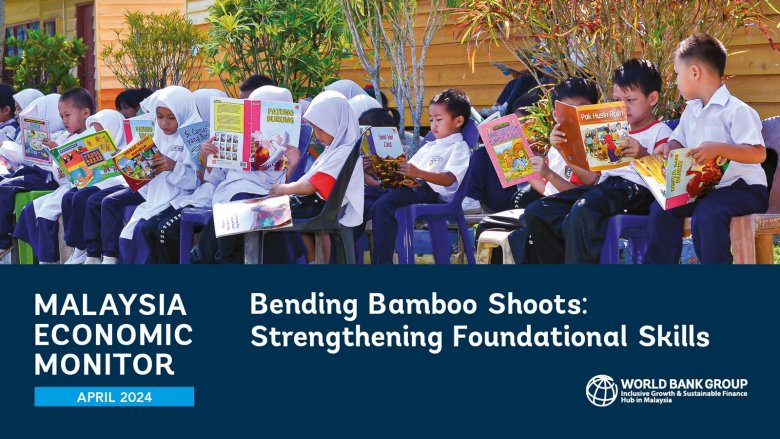KUALA LUMPUR, April 25, 2024�� Malaysia's long-term growth prospects depend critically on bolstering its human capital by improving learning outcomes for children, according to the World Bank Malaysia Economic Monitor, ��Bending Bamboo Shoots: Strengthening Foundational Skills�� launched today.
Since learning is cumulative, strong foundational skills will give Malaysia the advanced skills it needs to sustain growth and transition into high-income status. As efforts to attract private investments is stepped up, ensuring skilled workers are available will be crucial. However, firm surveys show unmet demand for workers with both soft skills such as problem-solving, leadership, and communications, and technical skills. To match the competitiveness of its aspirational peers such as Singapore and Korea or stay ahead of rising competitors like Vietnam, investing in quality early education and teacher performance is vital.
"Malaysia's challenge is to keep the economy growing while ensuring the public is able to manage the rising cost of living and secure well-paying jobs,�� said Malaysia Minister of the Economy Mohd Rafizi Ramli. ��In the short-term, the Government is stepping in with measures like implementing minimum and progressive wages along with targeted cash transfers. But in the long run, it's about turning education into productive employment. Strengthening education is key to a resilient and thriving economy."
Supporting teachers and improving basic education outcomes will be fundamental for reducing income inequality, a primary concern for the government as it contemplates fiscal reforms. Equal access to quality education gives more young people opportunities for social and economic advancement.
��Malaysia needs more sophisticated and advanced skills to transition into a high-income country,�� said World Bank Country Director for Brunei, Malaysia, Philippines, and Thailand Ndiame Diop. ��Advanced skills depend fundamentally upon strong foundational skills, which are developed through high-quality early childhood education and primary education. Malaysia already has a vibrant education system �� the next step is to ensure that all students have the foundational skills necessary to acquire more advanced skills.��
Malaysia has achieved near universal primary education with remarkable equity in resources and student experiences. Despite this, almost a quarter of children, including many from lower-income households, lack school readiness skills despite having attended early childhood centers, leading to challenges in reading, writing, and mathematics throughout their schooling. By the age of 15, Malaysian students lag behind aspirational peers in reading, math, and science, according to international assessments.
To address these challenges, Malaysia has implemented various programs such as the Reading Aid Programme and the Primary School Literacy and Numeracy Program. The teacher strategy outlined in the Malaysia Education Blueprint 2013-2025 aligns with global best practices.
The report offers four recommendations to improve learning outcomes: (1) Ensuring that all children benefit from high-quality preschool education and arrive in primary school ready to learn, (2) improving access to and the quality of early childhood education for lower-income households, (3) rigorously measuring student learning outcomes and benchmarking them to international standards while also measuring teacher performance thoroughly and (4) providing effective teacher training programs, as well as policies that consider teachers' experiences and needs, thus ensuring effectiveness and sustainability.

